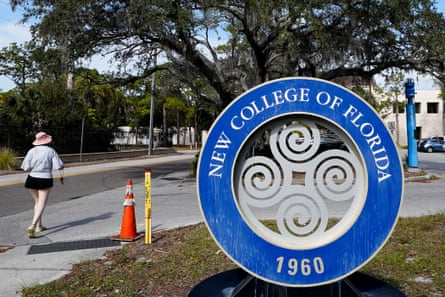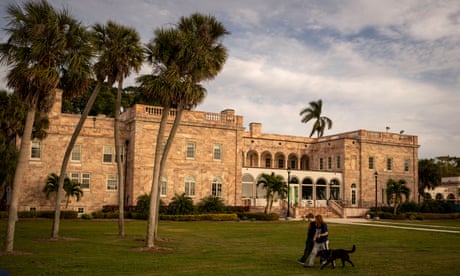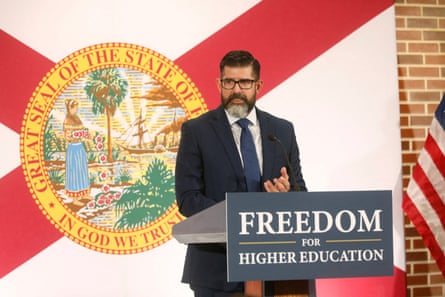About 300 books were removed from library shelves last year. Some teachers have resorted to using only excerpts from Shakespeare plays to avoid any “raunchiness” that might cost them their jobs. For DeSantis, the censorship is part of a so-called “war on woke”, intended to prevent the perceived indoctrination of students by leftwing influences.
Many of DeSantis’s harshest attacks have come against the College Board, a non-profit known for administering the SAT, a multiple-choice test that has been used for over 97 years as one of the primary tools in undergraduate admissions. (The ACT, another popular aptitude test, has existed since 1959.)
“This College Board, nobody elected them to anything,” DeSantis said in February. “They are just kind of there and they provide a service, and so you can either utilize those services or not.”
So now he’s promoting the Classic Learning Test, an upstart alternative entrance exam that can be used in applications to Florida’s university system for the first time this fall (the SAT and ACT will still be accepted).

The Classic Learning Test (CLT) emphasizes a “classical” style of education, where students study great works throughout western civilization, including pieces by Plato, Shakespeare and Voltaire. It’s been called the “Christian-backed” SAT, which isn’t entirely incorrect, as before this month the test was only accepted in admissions to private, faith-based colleges.
Officially, the CLT calls its board a mix of “college presidents & administrators, secondary school heads of schools, and nationally recognized leaders in education”. The majority of the board members work for Christian or conservative organizations.
Many of the excerpts included on the test come from religious texts. St Thomas Aquinas, Martin Luther, John Calvin and Pope John Paul II are among authors who appear on the CLT. One sample test includes a passage from The Way of Perfection, a book on how to pray by the 16th-century nun St Teresa of Ávila.
Another example uses text from the last sermon given by Jonathan Edwards, an 18th-century preacher best known for his fiery lecture Sinners in the Hands of an Angry God, which warned unbelievers about the horrors waiting for them in hell.
There are also writers in the test’s author bank who critiqued religious fanaticism, such as Mark Twain, Charles Darwin and Karl Marx. “On the CLT, you’re reading the most important texts that have driven society and culture,” said Jeremy Tate, founder of the CLT. “I’m not saying anybody needs to be Christian or Catholic, but it is the intellectual tradition that gave birth to the university.”
For each text, students read a passage and answer a series of questions aimed at assessing reading comprehension.

The “quantitative reasoning” section of the CLT might look more familiar to non-religious test-takers: it’s a series of math questions involving general algebra, geometry and physics.
Tate says he founded the exam to combat the erosion of morals in the public school system. He says his alternative test will bring “truth, goodness and beauty” back into the classroom and cure “an epidemic of student boredom”.
During a video interview with the Guardian, Tate spoke from his living room, with two icons of Jesus in view. He’s retweeted anti-abortion statements and often speaks out against the Department of Education. But he chafes at the suggestion that his test aligns with any partisan ideology. He believes the classics are for everyone.
“We understand the implications that come along with the move Florida has made,” Tate said. “We’re so grateful to them, but we want to keep insisting that this is not a Trumpy, conservative kind of education.”

Still, there are threads that connect his test with DeSantis’s agenda. The teens who take the CLT are most often homeschooled or enrolled in private high school; in May, DeSantis signed a law allowing parents to receive funds toward private school tuition or homeschooling materials.
DeSantis has said that he wants to turn New College of Florida – a public liberal arts college in Sarasota – into a “Hillsdale of the south”, referencing the Christian college in Michigan. Hillsdale relies on private donations rather than government support, allowing it to opt out of Title IX’s non-discrimination requirement. The college’s director of admissions and assistant education professor sit on the CLT’s board of academic advisers.
So does Christopher Rufo, a rightwing extremist who DeSantis appointed to New College of Florida’s board this year, along with five other DeSantis allies, who quickly ousted the college’s then president. Rufo is best known for popularizing the backlash against critical race theory and advancing the conspiracy theory that members of the LGBTQ+ community are “grooming” children.
Tate is quick to add that the CLT board also includes Cornel West, the leftwing public intellectual and Green party presidential candidate, who supports instituting Medicare for All and abolishing student debt.
The CLT’s website touts enthusiastic testimonials about Christian-based institutions. One student said the exam helped them get into their “dream school” of Liberty University, founded by the late televangelist Jerry Falwell, a longtime anti-gay crusader.
Tate began his career as a New York City high school teacher. He says he quickly burned out after working at a Brooklyn school where students seemed more interested in finding a job than studying the classics.
He started the CLT while working as a college admissions counselor at a Catholic academy in Maryland. There, too, he found that students were hesitant to take classes like philosophy because it did not give them an Advanced Placement (AP) credit they could use for their college applications. “I wondered how a testing company could be so powerful that Catholic kids didn’t want to take philosophy,” he said.
Part of Tate’s job included forging connections with representatives from religious colleges; those were the first institutions that agreed to accept the CLT.
Angel Adams Parham, a professor of sociology at the University of Virginia, is chair of the CLT’s academic board. She calls the test’s association with rightwing politics “most unfortunate”.
Parham, who is Black, challenges the notion that the classics lack relevance or a diverse audience.
“People say, ‘Oh, these texts are so old, they have nothing to do with my life,’” she said. “Well, Huey Newton of the Black Panthers thought Plato had something to do with his life and wrote about him in his autobiography.”
The board was “concerned” when it received news that Florida’s university system wanted to adopt the CLT, Parham says. According to Parham, members were reluctant to align with DeSantis’s administration.
“How could we not be concerned?” Parham added. “It’s so complicated, when the messenger is someone [like DeSantis] who’s not trusted.” Still, she emphasized that “nobody has to take this [test]”.

The CLT recently expanded its author list to include works by Black authors including Toni Morrison, Ida B Wells and Frederick Douglass. (Toni Morrison’s Pulitzer prize-winning novel Beloved was among those pulled from Florida’s public libraries last year.)
The New York Times reports that there is limited data available about the CLT. Academics wonder if it can effectively prepare students for college.
Stephen Sireci is the director of the Center for Educational Assessment at the University of Massachusetts Amherst. He believes there should be more competitors to the SAT and ACT, because one of the biggest criticisms of college admissions testing is that it’s developed from “a very white-centric perspective”.
But “this test seems like a really huge step backwards into the 20th century,” Sireci said. “Their list of authors are all from a Eurocentric context, therefore ignoring that the rest of the world exists.”
Tate and other CLT representatives argue that classical education matters because it uses texts that have “stood the test of time”, having been studied for centuries. But “there are plenty of texts in eastern literature and African literature, philosophy and theology that are also relevant to modern society,” Sireci said. “We can’t pretend [western] texts are the only ones that are.”
There is a movement in college admissions to de-emphasize standardized tests scores, in part because data shows these exams generally benefit white, wealthy students. Colleges such as Harvard, Stanford and the University of California system have dropped it as a requirement in recent years.
Kelly Rosinger, an associate professor of education and public policy at Penn State, says the College Board has taken steps in recent years to make its exams more culturally relevant to a wider group of students. “They’ve got a long way to go still,” she said. “But they are doing more than the CLT, which draws particularly on western thought, which historically privileges a white, male population, when we could be thinking about these tests much more inclusively.”
Only 21,000 high school students took the exam between 2016 and 2023. That’s much fewer than the SAT, which was taken by 1.7 million high school seniors last year alone, or the ACT , which was taken by 1.3 million.
Jayden D’Onofrio, an 18-year-old freshman at Florida State University, does not know any students who have taken the CLT. Perhaps that’s unsurprising: D’Onofrio is a student activist with Voters of Tomorrow, a Gen Z-led non-profit that works to mobilize young voters for Democratic candidates and causes.
“The problem with the test arises because it goes along with a highly politicized process,” D’Onofrio said.
Florida educators are dealing with one of the worst teacher shortages in the country, unfolding in no small part due to DeSantis’s interference with their jobs.
“This test and other events that are happening now have led to this incredibly high frustration and dissatisfaction level from teachers in Florida,” said Andrew Spar, president of the Florida Educational Association.
“The guy who created this test said he was trying to make an alternative to standardized tests, but he created another standardized test, just with a religious slant,” he said.
